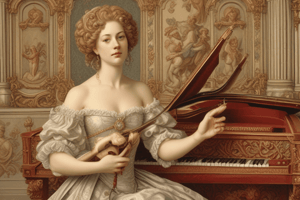Podcast
Questions and Answers
A feature of Baroque music was the use of terraced dynamics.
A feature of Baroque music was the use of terraced dynamics.
True (A)
The patronage system allowed composers to sell their works to the highest bidder.
The patronage system allowed composers to sell their works to the highest bidder.
False (B)
Because there was no body of established music, many Baroque composers wrote a tremendous amount of music.
Because there was no body of established music, many Baroque composers wrote a tremendous amount of music.
True (A)
Baroque orchestras performed with only the keyboard player indicating when to begin.
Baroque orchestras performed with only the keyboard player indicating when to begin.
One of the reasons why recitatives were favored, especially for dramatic purposes was:
One of the reasons why recitatives were favored, especially for dramatic purposes was:
During the Baroque period the modes were largely abandoned in favor of major and minor keys.
During the Baroque period the modes were largely abandoned in favor of major and minor keys.
What was the belief behind the 'doctrine of affections'?
What was the belief behind the 'doctrine of affections'?
What tuning system compensated for the 'Pythagorean comma'?
What tuning system compensated for the 'Pythagorean comma'?
What were the approximate dates of the Baroque period in music?
What were the approximate dates of the Baroque period in music?
Name an important composer of music in the Baroque.
Name an important composer of music in the Baroque.
All but which one of the following is a characteristic of Baroque music?
All but which one of the following is a characteristic of Baroque music?
A feature of recitatives is:
A feature of recitatives is:
What was an important instrument in the Baroque period?
What was an important instrument in the Baroque period?
Except for recitatives, the rhythm in Baroque music was definitely metrical.
Except for recitatives, the rhythm in Baroque music was definitely metrical.
Although major and minor keys predominated in Baroque music, changes of key (tonal center) are rare.
Although major and minor keys predominated in Baroque music, changes of key (tonal center) are rare.
Flashcards are hidden until you start studying
Study Notes
Baroque Music Characteristics
- Terraced dynamics were a notable feature, demonstrating abrupt changes in volume rather than gradual crescendos.
- The patronage system did not involve selling works; composers were typically supported by wealthy patrons.
- Many Baroque composers produced an extensive amount of music due to the lack of an established repertoire.
Orchestral Practices
- Baroque orchestras relied on a keyboard player to signal the commencement of performances.
- Recitatives were favored in dramatic contexts for their expressive capability.
Musical Evolution
- The Baroque period saw a shift from modes to the dominance of major and minor keys.
- The "doctrine of affections" posited that music could evoke specific emotional responses.
Tuning and Temperament
- The "Pythagorean comma," an issue in tuning, was addressed through the adoption of equal temperament system.
Historical Context
- The Baroque period in music is generally recognized from 1600 to 1750.
- Prominent composers of this era include Handel and others.
Baroque Music Traits
- Characteristics of Baroque music include strong, definite rhythms, with metrical patterns being predominant except in recitatives.
- Recitatives are marked by features that enhance their expressive qualities.
Instrumentation
- The harpsichord was a significant instrument during the Baroque period, integral to the orchestration of the time.
- Changes of key, or tonal centers, were common within Baroque compositions, countering the notion of their rarity.
Studying That Suits You
Use AI to generate personalized quizzes and flashcards to suit your learning preferences.




